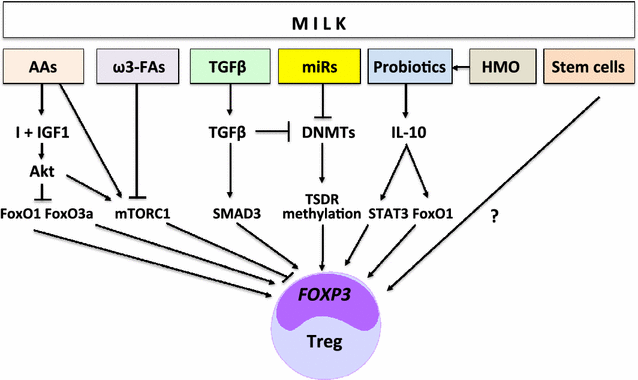Milk: a postnatal imprinting system stabilizing FoxP3 expression and regulatory T cell differentiation
- PMID: 27175277
- PMCID: PMC4864898
- DOI: 10.1186/s13601-016-0108-9
Milk: a postnatal imprinting system stabilizing FoxP3 expression and regulatory T cell differentiation
Abstract
Background: Breastfeeding has protective effects for the development of allergies and atopy. Recent evidence underlines that consumption of unboiled farm milk in early life is a key factor preventing the development of atopic diseases. Farm milk intake has been associated with increased demethylation of FOXP3 and increased numbers of regulatory T cells (Tregs). Thus, the questions arose which components of farm milk control the differentiation and function of Tregs, critical T cell subsets that promote tolerance induction and inhibit the development of allergy and autoimmunity.
Findings: Based on translational research we identified at least six major signalling pathways that could explain milk's biological role controlling stable FoxP3 expression and Treg differentiation: (1) via maintaining appropriate magnitudes of Akt-mTORC1 signalling, (2) via transfer of milk fat-derived long-chain ω-3 fatty acids, (3) via transfer of milk-derived exosomal microRNAs that apparently decrease FOXP3 promoter methylation, (4) via transfer of exosomal transforming growth factor-β, which induces SMAD2/SMAD3-dependent FoxP3 expression, (5) via milk-derived Bifidobacterium and Lactobacillus species that induce interleukin-10 (IL-10)-mediated differentiation of Tregs, and (6) via milk-derived oligosaccharides that serve as selected nutrients for the growth of bifidobacteria in the intestine of the new born infant.
Conclusion: Accumulating evidence underlines that milk is a complex signalling and epigenetic imprinting network that promotes stable FoxP3 expression and long-lasting Treg differentiation, crucial postnatal events preventing atopic and autoimmune diseases.
Keywords: Epigenetic; Exosome; FoxO1; FoxP3; MicroRNA; Milk; Probiotics; TGF-β; Treg; mTORC1.
Figures

References
Publication types
LinkOut - more resources
Full Text Sources
Other Literature Sources
Research Materials
Miscellaneous

